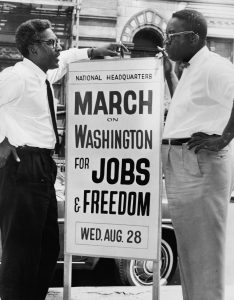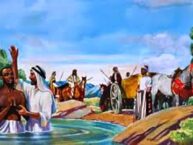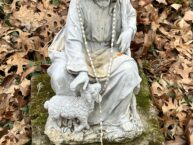
In front of 170 W 130 St., March on Washington, l to r, Bayard Rustin, Deputy Director, and Cleveland Robinson, Chairman of Administrative Committee / World Telegram & Sun photo by O. Fernandez.
January 19, 2020: May God’s words alone be spoken, may God’s words alone be heard. Amen.
Six years ago this very day I walked into this pulpit for the first time as your Rector. It was January 19, 2014 at 10:30am. I remember it well. To be sure, it was not my first time in this pulpit. Just days after receiving the invitation to accept this call from your vestry, but not yet in a written contract, I was already scheduled to be your supply priest for this tiny little thing…the Christmas Eve services.
No pressure or anything, I mean – mess this up on this most Holy night and that contract might not ever come to pass. And while I preached that Christmas Eve and looked out at those gathered, my heart was full, even while I knew I could not tell those there that night that I was going to be their new priest, as the official announcement would come the following week both here, and at the church where I was serving. Still, I knew I had been called into something amazing – a new relationship with all of you, and so six years ago today I stood here by God’s grace and nothing for me, and I pray for you, has been the same since.
That is why the date of January 19th at 10:30am is something I will never forget. It’s the way it is with life altering events, right? Folks remember where they were when Pearl Harbor was attacked, WWII broke out, President Kennedy was shot, Astronaut John Glenn put his foot out onto the lunar surface, the Challenger spacecraft exploded, and 9/11. And those who were around for it remember too when the Rev. Dr. Martin Luther King, Jr. delivered his “Dream” speech to the thousands gathered for the March on Washington for Freedom & Jobs…and where they were when they heard the terrible news that he had been killed.
These moments changed us – challenged us – demanded something of us. And we were never the same from those points forward.
And so when we hear in the second part of the gospel of John read today this story of people’s first encounter with Jesus it should not surprise us that the community that wrote this gospel noted something about it. The gospel account says “The next day John again was standing with two of his disciples, and as he watched Jesus walk by, he exclaimed, “Look, here is the Lamb of God!” The two disciples heard him say this, and they followed Jesus. When Jesus turned and saw them following, he said to them, “What are you looking for?” They said to him, “Rabbi” …where are you staying?” He said to them, “Come and see.” They came and saw where he was staying, and they remained with him that day. It was about four o’clock in the afternoon.
It was about four o’clock in the afternoon.
That’s a kinda funny thing to write down, don’t ya think? What was so special about it being 4pm? Something tells me it wasn’t the first century version of “It’s 5 o’clock somewhere.”
I suppose one might say it was a play by that Johannian community who authored it to harken the listener or reader to the prominent themes of light and dark found throughout this gospel. That may be true, but they could have said it differently as they do a lot elsewhere where it reads “And it was night.” They could have noted that the sun was setting, or it was late in the afternoon. They didn’t. And I think it is for the same reason we all remember seemingly minute details about major events in our own lives and in the world around us – things like where we were standing, what we were wearing, who was with us, where we had just been, and of course – the day and the time.
And why wouldn’t the gospel writers timestamp this moment, because it was when they first encountered Jesus, accepted his invitation to “come and see,” and oh what they saw. Now, I am not talking about them seeing where he was staying – though perhaps the details this local Holiday Inn may have been notable in some way. No, it was what he invited them into – to abide (or remain) with him. That is the meaning of the Greek word translated here as “seeing” and “staying.” Come and abide.
So at 4pm – they encountered Jesus.
I suppose for the rest of us it may be asked – when did we?
Of course for many of us, this is one of those types of questions that get us squirming in the pew – not because it isn’t important, but because there are some who call themselves “Christian” who have taken this question to be something more like a criminal charge. You know that person, right? Maybe it is someone in your office, or you encountered on the street, asking you something like “Have you found Jesus?”
Of course my favorite reply is “I didn’t know he was lost, but my guess is you will find him standing beside all those people you claim God hates.” Yup – that kind of stuff brings out my snarky side, which is yet another reason why I am grateful for the opportunity to confess my sins each day.
So no, that type of weaponizing Jesus isn’t what I am getting at by asking that question. I am speaking about what John in this gospel trying to tell everyone, because John is proclaiming the very truth of why encounters with Jesus would be life changing, and why we would remember it.
At the opening of this passage, before we get to the two who followed Jesus, we hear this about that wild and crazy guy John, commonly called “the baptizer,” though in this gospel – in fact this very passage – you will note he does NOT baptize Jesus. It says “John saw Jesus coming toward him and declared, “Here is the Lamb of God who takes away the sin of the world!”
Now before you start squirming again about that whole sin reference, we need to remember this about the Gospel of John – sin in this gospel is not about morality or bad things we do, well not specifically anyway. When John talks about Jesus as the lamb of God, he is not talking about a scapegoat, or some sort of sacrifice for atonement. He is talking about the lamb of Passover, whose blood was placed on the doors by the Jewish faithful that the evil to befall the Egyptians would pass over them. That blood being a sign of those in a covenant, or relationship, with God. Sin in this gospel is about not being in relationship with God. Jesus is the one to bring us to abide with God – to encounter God – to be in relationship with God. This is why God became incarnate – why God put aside Kairos – God’s time – to enter into Chronos – our time.
And here’s the thing about relationship…we remember when it begins, don’t we? Mothers can remember when their children were born – sometimes right down to the minute. Some who are in love remember not only the date of their first meeting, but perhaps even the moment their eyes beheld one another.
And that is the way it is with God too, because God is love – and wants so much for us to feel that love – to enter into relationship – that God came into the world – and the Word was made flesh and dwelt among us. This is why encountering Jesus – encountering God – would be something that would change us, because the thing about love and relationship – the kind we abide in when we say yes to the invitation to it – it fills us with hope for what may be. That is why Jesus invited those first disciples to “come and see,” “come and abide with me.”
Think about it. Think to when you were first in love. How did that feel? Hopeless, depressed, sad, despairing? No, or at least I hope not. Or was it that you felt joyful for what is and hopeful for what might be? Love, real and abiding love, is like that. It can change us in ways we never thought imaginable. And it is the stuff of dreamers and prophets through the ages. Prophets like the one we heard today in Isaiah, and the one we celebrate tomorrow, the Rev. Dr. Martin Luther King, Jr. Because you can’t dream of what may be without hope, without love, and Dr. King would argue, as would I, without faith. And that speech he gave was his way of saying “Come and see.” Come and see what I have dreamed – abide with me in it – and we did. And while it may not have been 4pm, it was August 28th 1963 in Washington, DC, and anyone who has ever heard it has never been the same.
But that invitation King gave to those there was itself the result of one he got in the midst of his speech. Some of you may know that the dream part of that speech was not supposed to happen. His advisors told him not to do it (he had previously used a version of it in Detroit during another speech) In fact, when he did start it, one of them was quoted later as having said “Oh, S-word, he’s doin’ it,” or something to that effect. So King was giving a different speech when from the crowd he heard Singer Mahalia Jackson saying “Tell ‘em about the dream, Martin!” and he did – thanks be to God!
Mahalia invited King who invited us to share a dream for the world – one filled with hope for what may be, that changes us – changes the world, and I assure you that Dr. King would tell you that what he was inviting us into wasn’t about him, wasn’t his dream alone. It was about the dream of God for us all. He was inviting us to encounter Jesus – to come and see and abide in him – that we might return into relationship with God – a God that loves us, and commands us to love one another.
And in the gospel, Jesus invited those disciples who in turn, invited others, and they were forever changed, and so too the world.
What about you?
See, whether or not you can answer the question about your first encounter with God, I hope you can answer the question about your last one. Because the thing is, Jesus is always inviting you to abide with him, and you do encounter him each and every day, even if you don’t recognize him in that moment. Was it the time you first realized you were loved by God? Or perhaps it was in the Eucharist? Was it when you realized you were called to a certain lay ministry in the world? Or when you saw Jesus in the eyes of the sick, the lonely, the imprisoned, the oppressed, and the forgotten.
Jesus is still saying to you “come and see,” and still hoping that when we do, we go out and share with others, and invite them to do the same. But Christ’s invitation to us may come through the very person we might least expect. Because here’s another thing about that famous March on Washington – it came together in a very short time through the inspiring, and really miraculous, work of someone who in those days was oppressed not only by whites, but by people of color – and is still oppressed by many today. His name was Bayard Rustin – and he was gay.
Bayard, an African American, had been working for the rights of the oppressed – black, white, gay, laborers – for decades. But because of his sexuality, he had to work in the background of the movement. It is said that he was the one who coached Dr. King about nonviolence, after helping to organize the Southern Christian Leadership Conference, which provided a foundation for King’s leadership. After his death in 1987, President Obama posthumously awarded Rustin in 2013 with the Presidential Medal of Freedom, the highest civilian honor.
Rustin invited the thousands, who in turn were invited to share in “Martin’s dream,” who in turn was responding to an invitation to share that dream by Ms. Jackson. And here’s the thing – all of it was an invitation by Jesus to come and see and abide with him. Because it should never surprise us that an invitation to abide with Jesus may come through an encounter with the oppressed. For there is no one with whom Jesus abides more than those others have cast aside.
And so let us consider again…
What time was it when you encountered Jesus?
What time was it when you experienced his invitation?
And perhaps most importantly…
What time was it when you shared him with someone else?
Because if that time hasn’t happened yet, if we are not responding to our encounter with an invitation to others, as those first followers did, as Dr. King did in his faith, then we have not yet fully allowed ourselves to abide with Jesus. Sharing our faith is how we invite others to come and see, it is how we invite others into the dream of God. And here’s the thing about it – our invitation, whether or not they accept, will change us in ways we never thought possible.
And so on this weekend when we remember Dr. King, and we hear the invitation of Jesus to come and see, and abide, let us remember the dream, the one springing from the hope of our faith. Let us remember these words that King proclaimed, rooted in the words of the prophet of second Isaiah we heard today, because it is as needed as much now as it was then:
Dr. King said, “I have a dream that one day every valley shall be exalted, every hill and mountain shall be made low, the rough places will be made plain, and the crooked places will be made straight, and the glory of the Lord shall be revealed, and all flesh shall see it together.
This is our hope. This is the faith that I go back to the South with. With this faith we will be able to hew out of the mountain of despair a stone of hope. With this faith we will be able to transform the jangling discords of our nation into a beautiful symphony of brotherhood. With this faith we will be able to work together, to pray together, to struggle together, to go to jail together, to stand up for freedom together, knowing that we will be free one day.”
Thank you Bayard Rustin for inviting us to DC to fight for all God’s children.
Thank you Mahalia Jackson for inviting Martin to tell us his dream.
Thank you Dr. King for inviting us into your vision of hope.
Thank you Jesus for inviting us to come and see.
And now it is up to us.
Will you accept the invitation?
Because I guarantee that if you do – you will remember the day and time it happened.
Amen.
For the audio from the 10:30am service, click below, or subscribe to our iTunes Sermon Podcast by clicking here:
Rev. Diana L. Wilcox
Christ Church in Bloomfield & Glen Ridge
January 19, 2020
The Second Sunday After The Epiphany
1st Reading – Isaiah 49:1-7
Psalm 40:1-12
2nd Reading – 1 Corinthians 1:1-9
Gospel – John 1:29-42






